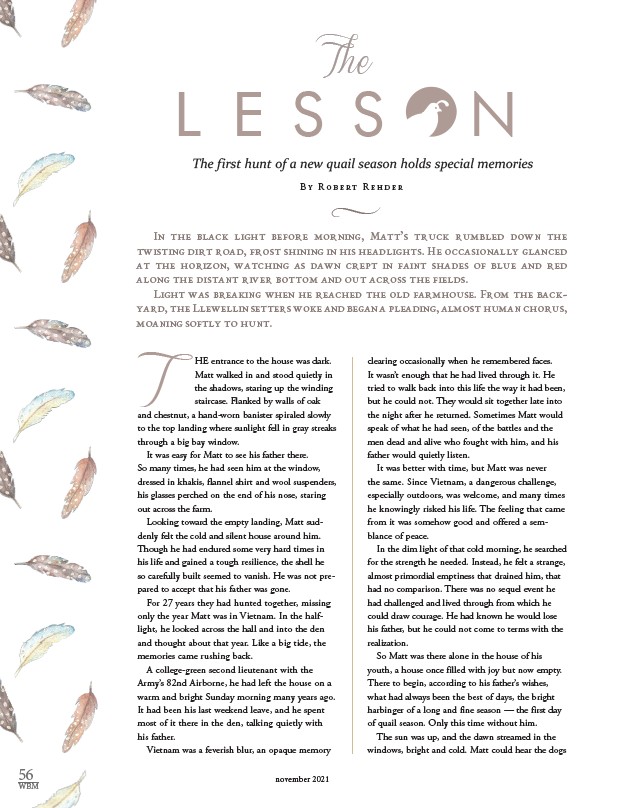
The
LESS N
The first hunt of a new quail season holds special memories
B y Ro b e rt R e h d e r
In the black light before morning, Matt’s truck rumbled down the
twisting dirt road, frost shining in his headlights. He occasionally glanced
at the horizon, watching as dawn crept in faint shades of blue and red
along the distant river bottom and out across the fields.
Light was breaking when he reached the old farmhouse. From the back-yard,
the Llewellin setters woke and began a pleading, almost human chorus,
november 2021
8
T HE entrance to the house was dark.
Matt walked in and stood quietly in
the shadows, staring up the winding
staircase. Flanked by walls of oak
and chestnut, a hand-worn banister spiraled slowly
to the top landing where sunlight fell in gray streaks
through a big bay window.
It was easy for Matt to see his father there.
So many times, he had seen him at the window,
dressed in khakis, flannel shirt and wool suspenders,
his glasses perched on the end of his nose, staring
out across the farm.
Looking toward the empty landing, Matt sud-denly
felt the cold and silent house around him.
Though he had endured some very hard times in
his life and gained a tough resilience, the shell he
so carefully built seemed to vanish. He was not pre-pared
to accept that his father was gone.
For 27 years they had hunted together, missing
only the year Matt was in Vietnam. In the half-light,
he looked across the hall and into the den
and thought about that year. Like a big tide, the
memories came rushing back.
A college-green second lieutenant with the
Army’s 82nd Airborne, he had left the house on a
warm and bright Sunday morning many years ago.
It had been his last weekend leave, and he spent
most of it there in the den, talking quietly with
his father.
Vietnam was a feverish blur, an opaque memory
clearing occasionally when he remembered faces.
It wasn’t enough that he had lived through it. He
tried to walk back into this life the way it had been,
but he could not. They would sit together late into
the night after he returned. Sometimes Matt would
speak of what he had seen, of the battles and the
men dead and alive who fought with him, and his
father would quietly listen.
It was better with time, but Matt was never
the same. Since Vietnam, a dangerous challenge,
especially outdoors, was welcome, and many times
he knowingly risked his life. The feeling that came
from it was somehow good and offered a sem-blance
of peace.
In the dim light of that cold morning, he searched
for the strength he needed. Instead, he felt a strange,
almost primordial emptiness that drained him, that
had no comparison. There was no sequel event he
had challenged and lived through from which he
could draw courage. He had known he would lose
his father, but he could not come to terms with the
realization.
So Matt was there alone in the house of his
youth, a house once filled with joy but now empty.
There to begin, according to his father’s wishes,
what had always been the best of days, the bright
harbinger of a long and fine season — the first day
of quail season. Only this time without him.
The sun was up, and the dawn streamed in the
windows, bright and cold. Matt could hear the dogs
moaning softly to hunt.
56
WBM